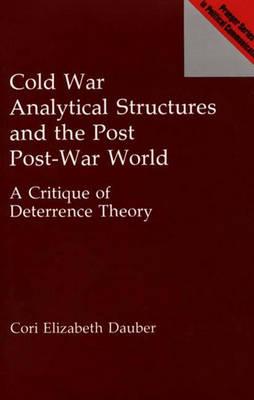Overview
This volume takes a perspective on the debate over deterrence theory that has never been used before. Other books either address the differences between the two competing schools of thought--those who support Mutual Assured Destruction (MAD) and those who support nuclear warfighting--or examine particular policies from within the perspective of one or the other school of thought. Cori Dauber examines deterrence theory at a structural level, which allows a focus on the similarities between the major perspectives on nuclear strategic doctrine. By examining such issues as validity standards and the evaluation of evidence, Dauber is able to assess deterrence as a theory of persuasion, and to examine the way deterrence discourse so shapes the thinking of policy makers and analysts that it still drives our analysis of alternatives, even in the post-Soviet era. Dauber concludes that deterrence is a system designed to use weapons capabilities as a form of non-verbal communication with an Other--for the last forty years, the Soviet Other. Understanding these rhetorical structures and the way they function is essential in predicting the restrictions that deterrence places on the way the United States responds to foreign nations. Cold War Analytical Structures and the Post Post-War World serves as a model for how scholars in argument and persuasion can apply their methods to real world situations.
Full Product Details
Author: Cori E. Dauber
Publisher: Bloomsbury Publishing Plc
Imprint: Praeger Publishers Inc
Dimensions:
Width: 15.60cm
, Height: 1.40cm
, Length: 23.40cm
Weight: 0.493kg
ISBN: 9780275944193
ISBN 10: 0275944190
Pages: 224
Publication Date: 22 February 1993
Recommended Age: From 7 to 17 years
Audience:
College/higher education
,
Undergraduate
,
Postgraduate, Research & Scholarly
Format: Hardback
Publisher's Status: Active
Availability: Manufactured on demand

We will order this item for you from a manufactured on demand supplier.
Reviews
?Of most interest to scholars of communication theory and strategic perception and psychology.?-Choice
Of most interest to scholars of communication theory and strategic perception and psychology. -Choice ?Of most interest to scholars of communication theory and strategic perception and psychology.?-Choice
?Of most interest to scholars of communication theory and strategic perception and psychology.?-Choice Of most interest to scholars of communication theory and strategic perception and psychology. -Choice
Author Information
CORI ELIZABETH DAUBER is Assistant Professor of Speech Communication and Director of Forensics at the University of North Carolina, Chapel Hill, where she is a member of the Curriculum on Peace, War, and Defense. She has worked primarily in the area of argument studies and the rhetoric of defense, and has published articles in Defense Analysis, Political Communication and Persuasion, and the Journal of the American Forensic Association.




